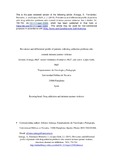Mostrar el registro sencillo del ítem
Prevalence and differential profile of patients with drug addiction problems who commit intimate partner violence
| dc.creator | Arteaga Olleta, Alfonso | es_ES |
| dc.creator | Fernández-Montalvo, Javier | es_ES |
| dc.creator | López-Goñi, José Javier | es_ES |
| dc.date.accessioned | 2018-04-13T15:50:09Z | |
| dc.date.available | 2018-04-13T15:50:09Z | |
| dc.date.issued | 2015 | |
| dc.identifier.citation | Arteaga, A. , Fernández‐Montalvo, J. and López‐Goñi, J. J. (2015), Prevalence and differential profile of patients with drug addiction problems who commit intimate partner violence. Am J Addict, 24: 756-764. doi:10.1111/ajad.12302 | en |
| dc.identifier.issn | 1055-0496 (Print) | |
| dc.identifier.issn | 1521-0391 (Electronic) | |
| dc.identifier.uri | https://hdl.handle.net/2454/28250 | |
| dc.description.abstract | Background and objectives: The objectives of this study were, first, to explore the prevalence of aggressors with lifetime intimate partner violence (IPV) among patients in the Proyecto Hombre of Navarra (Spain) addiction treatment programme; and second, to know the specific and differential characteristics of patients presenting IPV as aggressors. Methods: A sample of 162 patients (119 men and 43 women) was assessed. Data on socio-demographic and substance consumption characteristics, IPV variables, psychopathological symptoms, and personality variables were obtained. The profiles of patients in addiction treatment with and without a history of violence towards their partners were compared. Results: The results showed that 33.6% of people in treatment for addiction had committed violence against their partners. This prevalence was significantly higher (X2 = 15.6, p < .001) in women (63.3%) than in men (24.2%). In the 98.4% of the cases the IPV was bidirectional. Patients with a history of IPV perpetration showed greater severity in substance consumption variables, psychopathological symptoms, and personality traits. Gender, the family scale on the European version of the Addiction Severity Index (EuropASI), and the aggressive-sadistic scale on the Millon Clinical Multiaxial Inventory (MCMI-III) were the main variables related to the presence of IPV as aggressors. Discussion and conclusions: There was a differential profile in patients with IPV perpetration, showing more psychopathological and personality symptoms. Moreover, in this study being a woman was one of the main predictors of committing IPV. | en |
| dc.description.sponsorship | This study was supported by a grant (code PSI2009-08500) from the “Ministerio de Ciencia e Innovación” of the Spanish Government. | en |
| dc.format.mimetype | application/pdf | en |
| dc.language.iso | eng | en |
| dc.publisher | Wiley | en |
| dc.relation.ispartof | The American Journal on Addictions, (2015), 24(8), 756-764 | en |
| dc.rights | © American Academy of Addiction Psychiatry | en |
| dc.subject | Violent behaviour | en |
| dc.subject | Drug addiction | en |
| dc.subject | Intimate partner violence | en |
| dc.subject | Comorbidity | en |
| dc.subject | Assessment | en |
| dc.title | Prevalence and differential profile of patients with drug addiction problems who commit intimate partner violence | en |
| dc.type | Artículo / Artikulua | es |
| dc.type | info:eu-repo/semantics/article | en |
| dc.contributor.department | Psicología y Pedagogía | es_ES |
| dc.contributor.department | Psikologia eta Pedagogia | eu |
| dc.rights.accessRights | Acceso abierto / Sarbide irekia | es |
| dc.rights.accessRights | info:eu-repo/semantics/openAccess | en |
| dc.identifier.doi | 10.1111/ajad.12302 | |
| dc.relation.publisherversion | https://doi.org/10.1111/ajad.12302 | |
| dc.type.version | Versión aceptada / Onetsi den bertsioa | es |
| dc.type.version | info:eu-repo/semantics/acceptedVersion | en |


